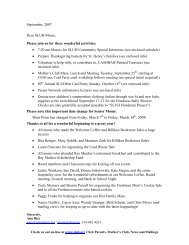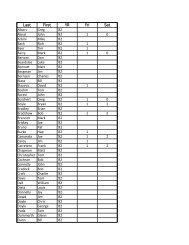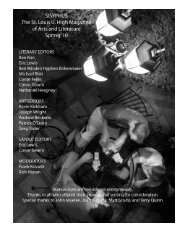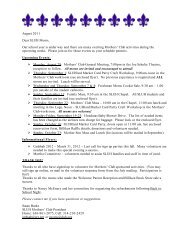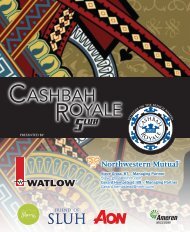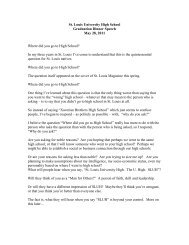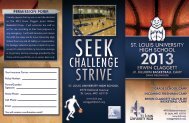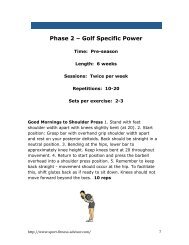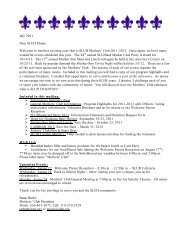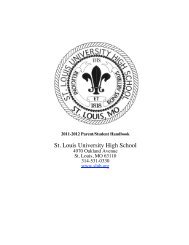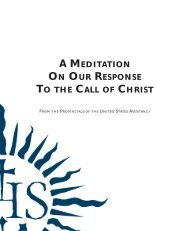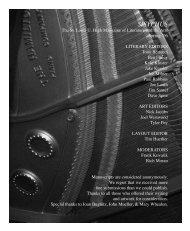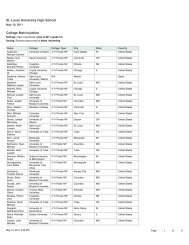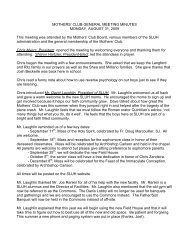SLUH Student and Parent Handbook - St. Louis University High ...
SLUH Student and Parent Handbook - St. Louis University High ...
SLUH Student and Parent Handbook - St. Louis University High ...
You also want an ePaper? Increase the reach of your titles
YUMPU automatically turns print PDFs into web optimized ePapers that Google loves.
school cannot overlook even casual cheating without compromising its<br />
mission. Therefore, cheating will not be tolerated.<br />
Cheating includes--but is not limited to - the passing of answers on quizzes <strong>and</strong><br />
tests; the seeking, receiving, or transmitting of specific information about<br />
questions on a test; the lending or copying of homework; use of cheat sheets or<br />
their possession in the testing room; acts of plagiarism.<br />
The term plagiarism, perhaps, requires further explanation. Plagiarism is the<br />
use of another's words or ideas as if they were one's own. To avoid plagiarism<br />
when using another person's thoughts, the writer must acknowledge the<br />
origin of the ideas <strong>and</strong> use quotation marks to indicate borrowed<br />
language. Within the context of a specific class, a writer may ordinarily<br />
incorporate into his paper ideas discussed in that specific class without<br />
crediting the teacher or fellow-students. In that case, there is clearly no intent<br />
to disguise the intellectual debt. However, published material, including<br />
passages <strong>and</strong> ideas from h<strong>and</strong>outs <strong>and</strong> class texts, must always be attributed.<br />
The burden for enforcing this code of honesty falls on both students <strong>and</strong><br />
teachers. <strong><strong>St</strong>udent</strong>s should not lend their work out to others. If one student seeks<br />
another's assistance on an assignment, the assistance should be given in faceto-face<br />
instruction, not by passing written work from one student to another.<br />
The student who ignores this advice <strong>and</strong> makes his answers or work available<br />
to another shares responsibility <strong>and</strong> consequences if cheating occurs.<br />
The faculty member who discovers a student preparing to cheat outside of his<br />
or her own classroom setting (during an examination, in the library, or in the<br />
hallway, for example) will also, of course, report the incident to the pertinent<br />
teacher. The classroom teacher who discovers or receives evidence of cheating<br />
will, at an appropriate time, confront the suspected student <strong>and</strong>, upon<br />
confirmation that cheating has taken place, register an F as the assignment or<br />
test grade, the F grade can range from a 0% to the highest F possible in the<br />
teacher's grading scale. The student will have no opportunity for make-up<br />
with an alternate assignment. The teacher will also notify the student's<br />
parent(s) in writing of the specific offense. A copy of this written notice will be<br />
kept on file (until graduation) in the office of the Assistant Principal for<br />
Academics. If a second act of cheating occurs, the Assistant Principal for<br />
Academics will call for a conference with the student's parent(s). At this<br />
conference, the student's continued enrollment at <strong>St</strong>. <strong>Louis</strong> U. <strong>High</strong> will be<br />
considered. The manner of the offenses (quiz or examination? impulsive or<br />
premeditated? momentary or sustained?) will determine the severity of the<br />
consequences.<br />
Q. Library/Media Center<br />
The Robinson Library/Media Center is an integral part of the school<br />
curriculum <strong>and</strong> is designed to encourage intellectual curiosity, self-motivation<br />
13



